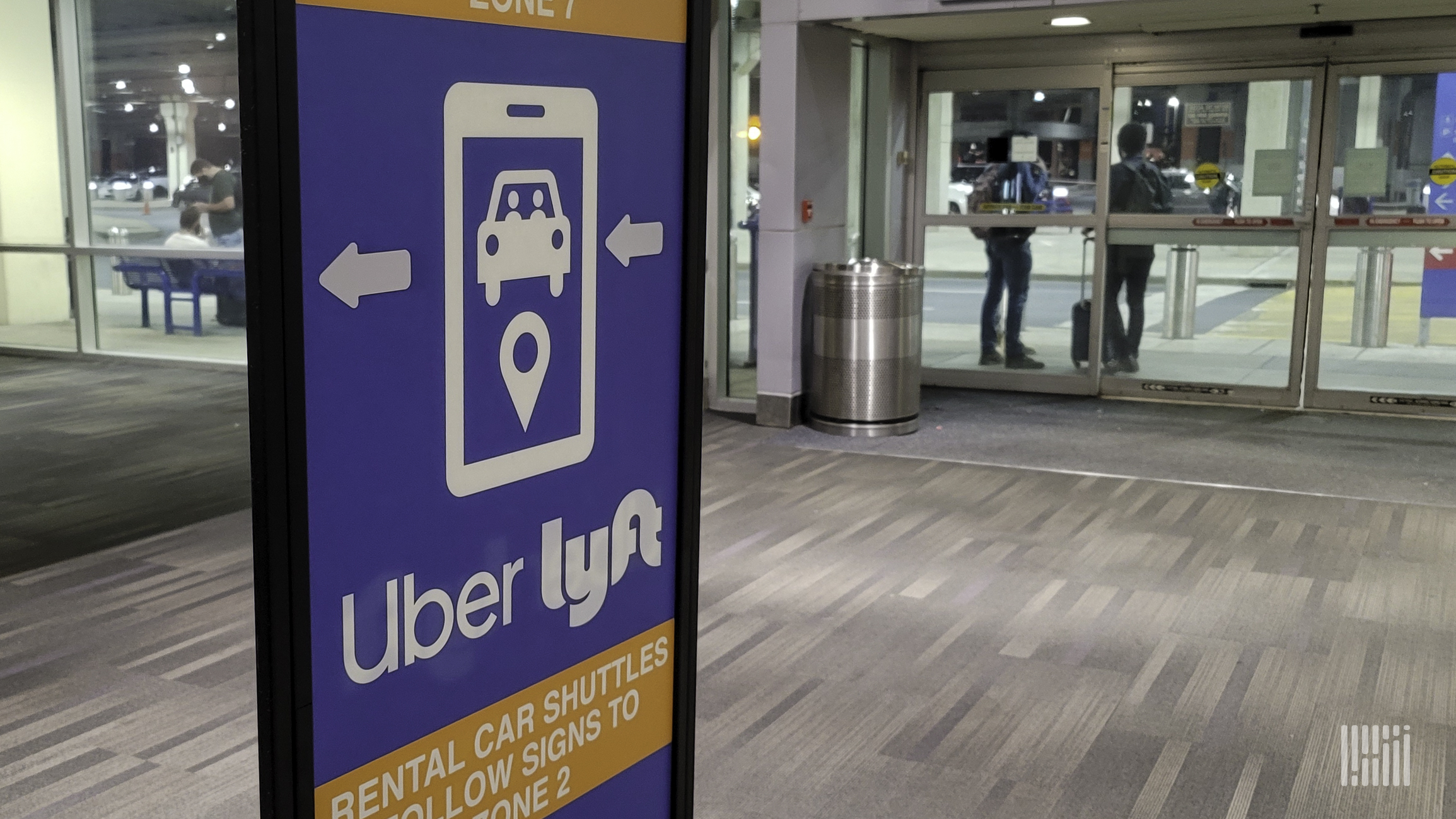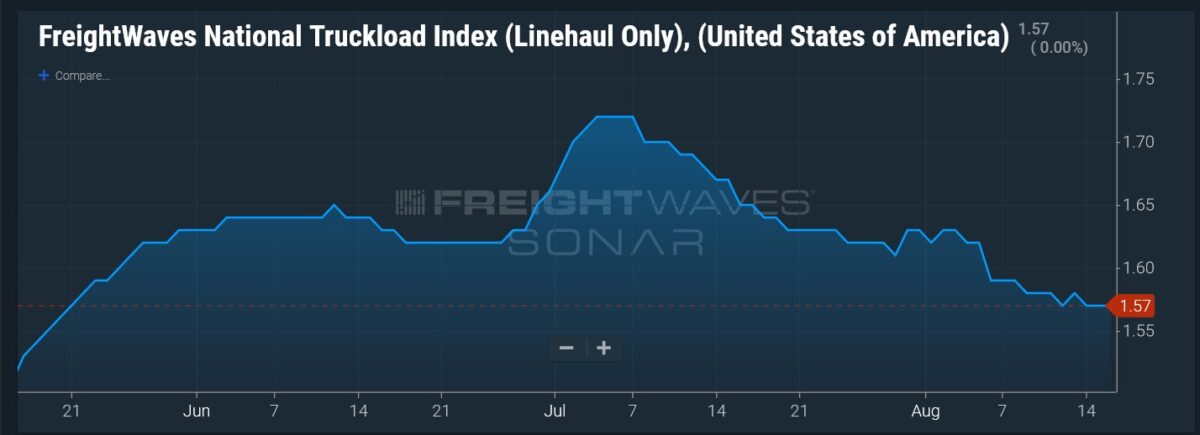Minneapolis Council approves bill mandating minimum compensation for party drivers

A bill mandating minimum wage levels for Uber and Lyft drivers in Minneapolis, including a per-mile rate not much lower than national rates for truckload rentals show, will head to the city’s sheriff’s office, where its fate is as yet unknown.
In a 7-5 vote, with one abstention, the Minneapolis City Council voted Thursday to approve legislation that would require several standard criteria for paying Uber and Lyft drivers to be met.
Among them is a requirement that a driver be paid “carriers,” as the city refers to them, $1.40 per mile and 51 cents per minute, the latter translating to about $15 an hour. The alternative would be to pay $5, but the actual compensation would be whichever is greater.
The rate is still $1.40 per mile less than the lowest truckload per mile rate recorded in SONAR’s National Truckload Index (linehaul only). It has trended between $1.50 and $1.70 per mile since about mid-February but has fallen below $1.50 per mile on at least one day during that time.

In an email to FreightWaves, ATBS president Todd Amen, whose work with independent landlord operators and their taxes has given him insight into driver pay, explained what those $2 drivers get per mile.
“Their net will be $0.65 to $.80/mile or about 38% of revenue after expenses are paid,” Amen wrote. “It gets a little more complicated as good truck drivers can make a lot more money by putting in more work.”
But once the fixed costs are covered, “their profit becomes their contribution margin which can be over $1/mile or over 50%.”
Under the Minneapolis ordinance, minimum fare rates must be paid only for the portion of the trip that is within the city limits. This would create the possibility of a trip from a suburb of Minneapolis to the same city operating at the two separate mileage rates.
Minnesota Public Radio (MPR) reports that Mayor Jacob Frey sent a letter to the council that appears to indicate skepticism about the proposed ordinance and its strict January 1, 2024 implementation timeline.
According to MPR, Frey said in the letter that “we should allow more time for deliberation.” CNN reported that Fry has until Wednesday to make his decision.
There has been a statewide effort to enforce similar minimum compensation levels across the North Star State. And while the legislation passed the Minnesota legislature, Democratic Governor Tim Walz He killed the effort in May with his first veto.
Jeremy Byrd, Lyft’s chief policy officer, sent a letter to Minneapolis City Council Speaker Andrea Jenkins on Tuesday that was clear in his opposition: “If this proposal becomes law, Lyft will be forced to cease operations in the City of Minneapolis on its effective date of January 1, 2024.”
Uber (NYSE: UBER) He did not make a wide public statement. However, various news reports said that Uber sent a letter to its drivers earlier this week asking them to reach out to their elected representatives and oppose the bill. “If this law is passed, we will unfortunately have no choice but to significantly reduce service, and possibly cease operations altogether,” Uber wrote in its letter to drivers, according to news reports.
Lift (NASDAQ: LYFT) The three-page letter said it was asking the city of Minneapolis to await policy recommendations of the Minnesota Commission on Compensation, Welfare, and Fair Treatment of the network carrier’s drivers. The letter describes it as a broad-based task force of drivers and Minneapolis government officials. The task force is to “engage with a broad and inclusive set of stakeholders and to do so within the most reasonable timescale.”
Frey’s letter also referred to the statewide task force, according to MPR.
Lyft’s speech also provided some statistics. Most Lyft drivers in Minnesota have annual household income that’s 17% lower than the state average, and 56% of Lyft trips in both Minneapolis and St. Paul “begin or end in low-income areas,” compared with 39% in Seattle. But if the bill becomes law, Lyft rides in Minneapolis could be “more expensive than a cab in Manhattan,” according to Lyft’s letter, which said rides that now cost $20 would double and operating expenses would double.
“Even if Lyft operated at a total loss on each ride and waived all platform and service fees, this proposal would significantly increase the price of each ride,” the company said in the letter.
Hubert Horan, an independent transportation analyst, has criticized Uber and Lyft’s business models. He was not sympathetic to the companies’ arguments against the legislation.
In a lengthy email to FreightWaves, Horan said that “the vast majority of these companies’ ability to reduce losses over the years has come from their ability to rein in driver compensation so that investors can keep a larger share of every customer dollar.”
“They could get away with such threats because of their incredibly predatory behavior ($33 billion in losses selling services below cost) that drove existing car service operators out of business and created an impregnable duopoly. In almost any other business, new competitors would start Who have the ability to earn money while meeting the rules of minimum service wages immediately.” “But everyone knows that Uber and Lyft will ruthlessly crush any serious efforts to introduce new competition.”
Horan said the two companies are “telling the citizens of Minneapolis that they are not entitled to take any actions that could curtail the full, unfettered freedom of these two groups of shareholders.” He added that this is not due to profitability. Uber and Lyft don’t want outsiders to realize how terrible the economics of these companies are, that passenger fares and service levels are now far worse than what traditional taxi companies provide, and that driver compensation has suffered greatly. They provided billions of dollars in benefits to many of the early investors, but absolutely everyone else is far worse off.”
More articles by John Kingston
An orchestrated fraud investigation returns to life in Louisiana with 5 new indictments
How 1 city curb overweight trucks
The takeaway from the shipping case: a sudden increase in volume in July
November 7-9, 2023 • Chattanooga, TN • In-person event
The second annual F3: Future of Freight Festival will be held in Chattanooga, the “scenic city”, this November. F3 combines innovation and entertainment – featuring live demonstrations, industry experts discussing 2024 freight market trends, afternoon networking events, and Grammy Award-winning musicians performing in the evening amid cool fall Appalachian weather.